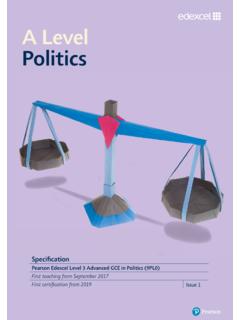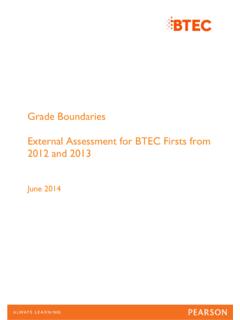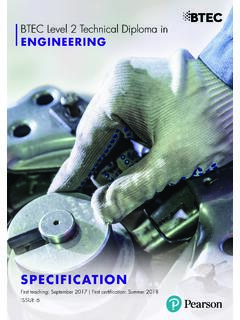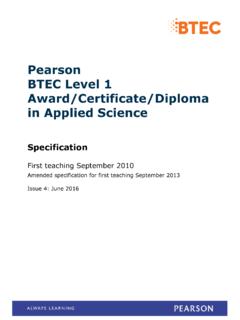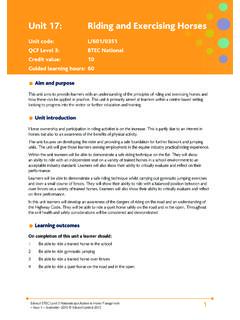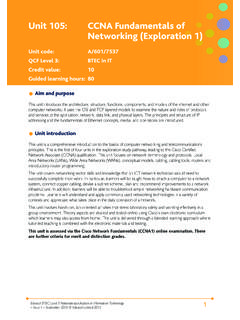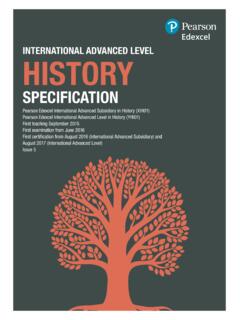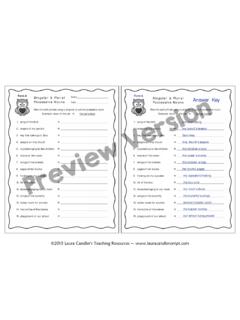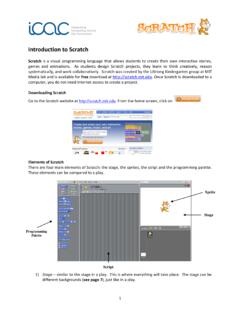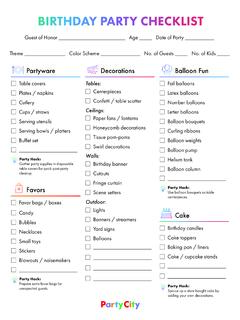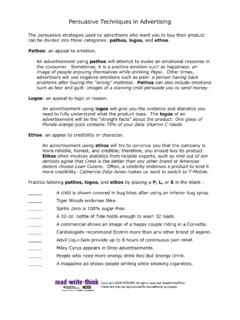Transcription of GCSE Drama glossaries for drama, performance, director and ...
1 GCSE Drama glossaries for Drama , performance, director and design roles Glossary of general Drama terms Term Definition antagonist the opponent or adversary of the hero or main character of a Drama . blocking deliberate choices about where the performers stand and how they move on stage to bring an extract to life. Sometimes known as staging, however for the purposes of this component, the term staging will always be used to refer to design elements. See below. catharsis emotional release felt by the audience at the end of a tragedy; the audience is set free from the emotional hold of the action, after sharing in the protagonist s troubles.
2 Character a person portrayed in a play. chorus a group of performers who sing, move, or recite in unison/as one. climax the point of greatest intensity in a series or progression of events in a play, often forming the turning point of the plot and leading to some kind of resolution. comedy a play that treats characters and situations in a humorous way. In Shakespeare s time, a comedy was any play with a happy ending that typically told the story of a likable character s rise to fortune. comic relief a break in the tension of a tragedy provided by a comic character, a comic episode, or even a comic line.
3 Conflict the internal or external struggle between opposing forces, ideas, or interests that creates dramatic tension. contrast dynamic use of opposites, such as movement/stillness, sound/silence, and light/darkness. d nouement the moment in a Drama when the essential plot point is unravelled or explained. development progression of the plot or conflict in a play. dynamic the energetic range of or variations within physical movement or the difference between levels of sound. ensemble unified effect achieved by all members of the cast working together, rather than a focus on individual performances, also be used to refer to the cast.
4 Exposition the part of a play that introduces the theme, main characters, and current circumstances. farce an extreme form of comedy depending on quick tempo and flawless timing, based on improbable events and farfetched coincidences. flashback in a non-linear plot, to go back in time to a previous event; a flash forward would move the action into the future. form refers to the shape of each individual section or scene movement/mime based ensemble scene, duologue, advert, moments of thought-tracking. fourth wall the invisible wall of a set through which the audience sees the action of the play.
5 Genre a French word meaning category or type , comedy, tragedy, docudrama, farce, or melodrama. irony an implied discrepancy between what is said and what is meant. When the audience perceives something that a character does not Term Definition know, that is dramatic irony. melodrama a style of play, which originated in the 19th century, relying heavily on sensationalism and sentimentality. mood the tone or feeling of the play, often established or enhanced or by production or design elements. monologue a long speech made by one performer; a monologue may be delivered alone or in the presence of others.
6 Naturalism Drama which attempts to represent real life on stage; actions tend to be shaped by determinism (societal or environmental forces). parody a mocking or satirical imitation of a literary or dramatic work. plot the events and sequences of action within a play, sometimes known known as narrative or storyline. protagonist the main character or hero in a play or other literary work. realism an attempt in theatre to represent everyday life and characters as they are or appear to be. resolution how the problem or conflict in a Drama is solved or concluded.
7 Role the character portrayed by a performer in a Drama . satire a play in which sarcasm, irony, and ridicule are used to expose or attack folly or pretension in society. scene a small section or portion of a play. setting when and where the action of a play takes place. stage directions instructions given by the playwright about how a play should be staged, when actors should make their entrances and exits and how lines should be delivered. staging the use of the stage as a design element, considering: choice of stage; positioning of entrances/exits, set items, stage furniture, levels; awareness of audience; creating an appropriate space for performers/audience style style relates to the chosen theatrical approach naturalist, minimalist, Brechtian etc.
8 Stock characters characters who represent particular personality types or characteristics of human behaviour. stimulus an object, image, piece of text, music or video that inspires devised work. (NB: For GCSE NEA purposes this must not be from a play text). storyline the plot or sequence of actions within a play. structure The arrangement of and relationship between the scenes/acts within a play or piece of devised theatre. suspense a feeling of uncertainty as to the outcome, used to build interest and excitement on the part of the audience. tempo the relative speed or rate of movement/voice/sound.
9 Can be applied to dramatic contexts such as in tempo rhythm . tension anxiety felt by the audience due to a threat to character(s)in the play. theatre maker a professional who contributes to a theatrical production such as a performer, director , or designer. tragedy a form of Drama based on human suffering that invokes in its audience an accompanying catharsis. turning point: the climax or high point of a story, when events can go either way. Performance glossary (for performers and directors of performers) Term Definition acting style a particular manner of acting that reflects cultural and historical influences.
10 Articulation the clarity or distinction of speech. aside lines spoken by an performer to the audience and not supposed to be overheard by other characters on stage. blocking the path formed by the performer s movement on stage, usually determined by the director with assistance from the performer. characterisation how a performer uses body, voice, and thought to develop and portray a character. dialogue spoken conversation used by two or more characters to express thoughts, feelings, and actions. focus in acting, the act of concentrating or staying in character.
